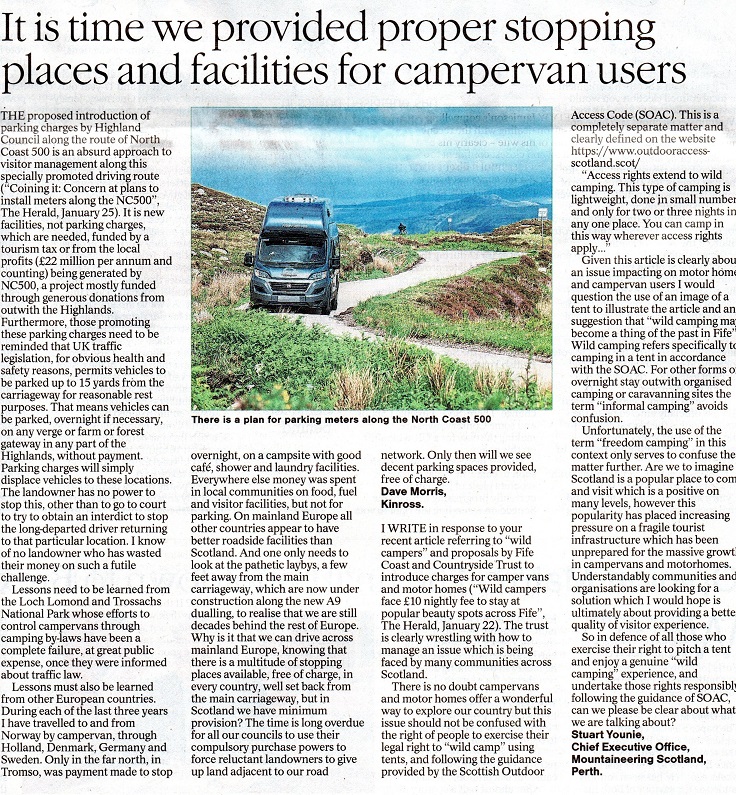
The two fine letters speak for themselves.
Sadly, there is now widespread misunderstanding about the law on access across Scotland:
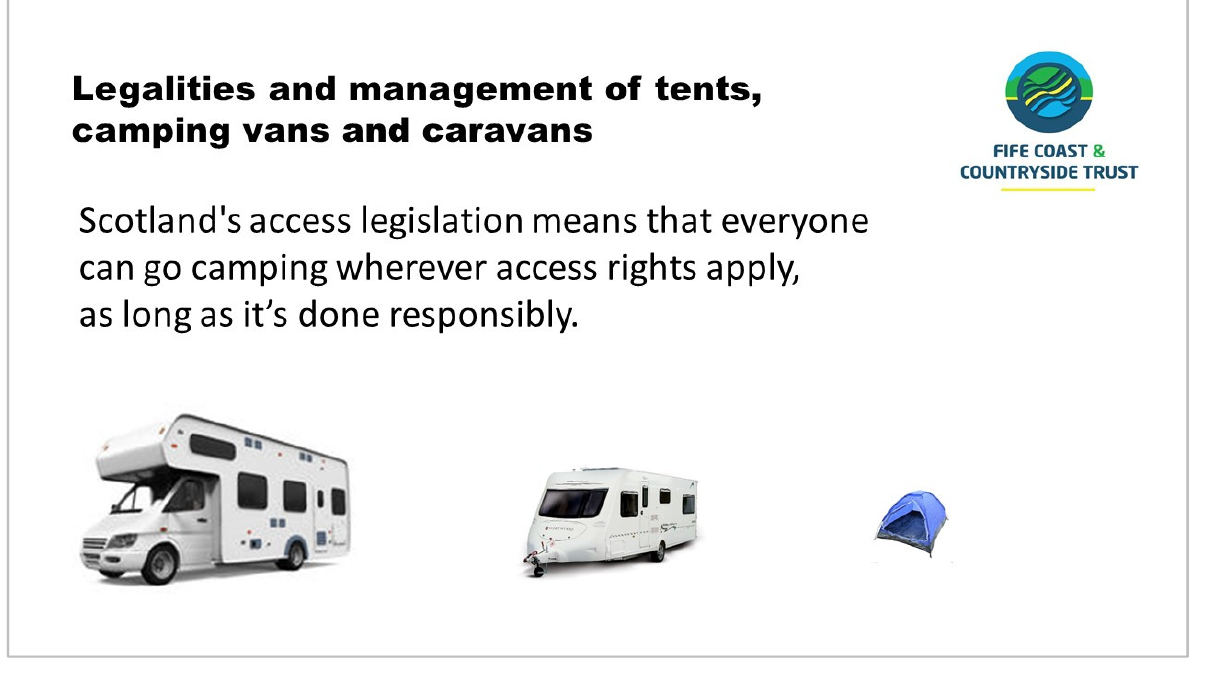
Camping is one of the activities covered by access rights but but those rights specifically exclude motor vehicles. This slide, appended to the consultation document issued by the Fife Coast and Countryside Trust on Freedom Camping (see here), is therefore a real howler. Only the landowner or their guest has the right to try and drive a motorhome to the top of the Ben because they want to spend the night there, however “responsibly” anyone else wants to do this, but everyone has the right to walk up and pitch their tent on the summit.
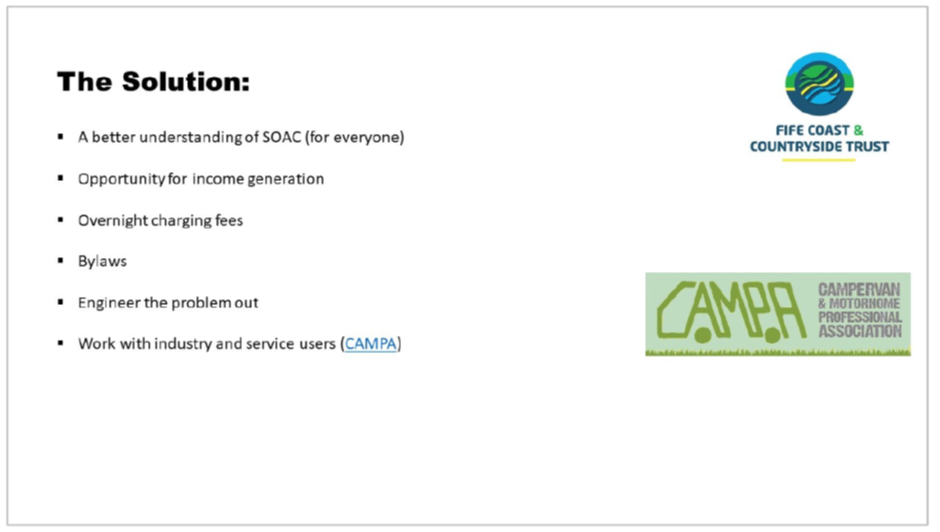
The legal confusion, introduced by the term “Freedom Campers” continues through other slides – SOAC applies to people exercising their access rights, not to where campervans can and cannot stay.
Had staff at the Fife Coast and Countryside Trust read the response from Dave Morris and myself to the petition from an SNP Councillor to the Scottish Parliament to create no wild camp zones in Scotland they would have understood this (see here). They might also have better appreciated the point made by Dave above that attempts to introduce compulsory parking charges, as Highland Council is trying to do, are likely to drive people elsewhere.
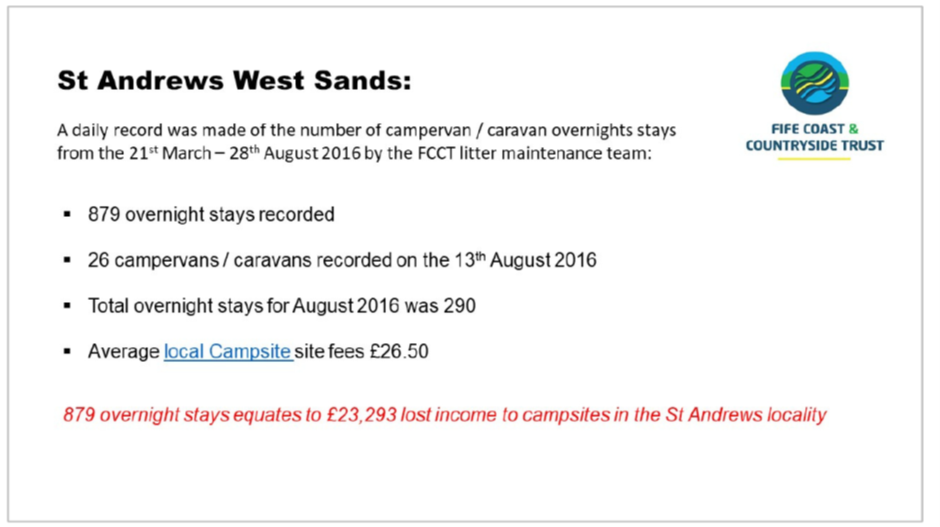
The reason for this is simple. Campervanners, as defined by Fife Coast and Countryside Trust, along with anyone else driving a vehicle has a legal right to stop off on most roads under the Road Traffic Acts. These are a distinct set of laws from access rights, albeit about the fundamental right to freedom of movement, and give people the right to move around in vehicles and stop off overnight on the roadside or road itself if needed unless explicitly prohibited by a road traffic regulation. If someone decides to spend the night in a campervan on the street outside my house there is very little I or anyone can do unless specific Traffic Regulation Orders have been put in place. Luckily common sense prevails and most campervanners try to find somewhere quiet to stop the night; start charging for those places though and there will be consequences (as I pointed out a couple of days ago (see here))
This fundamental misunderstanding of the law is a shame because there are some good things in the FCCT report including the legality of the various methods of charging for official and unofficial car parks.
Another recent example of this legal confusion is the Scottish Government’s consultation on introducing a tourist tax (see here):
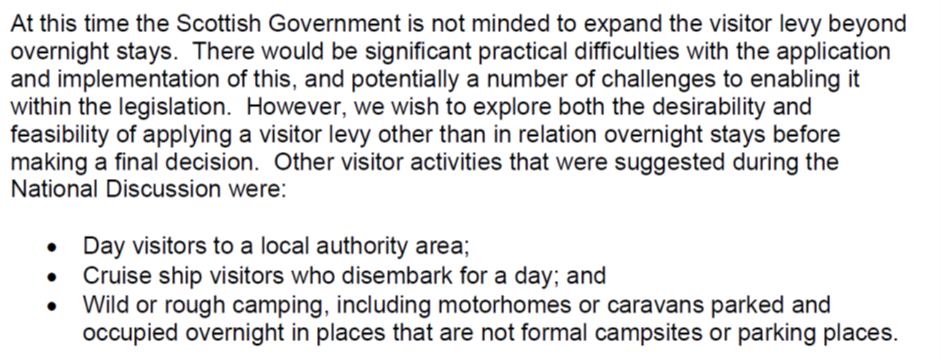
Note how motorhomes and caravans are included under “wild or rough camping”. Leave aside whether the a bednight tax is desirable or not, the Scottish Government appears not to understand that the feasibility of applying a “visitor” levy to campers and to campervanners at present depends on very different laws. They should have been included under different bullet points (and the mistake is repeated elsewhere in the document).
Responsibility for this legal confusion lies with the LLTNPA
The Fife Coast and Countryside Trust report contains this very interesting paragraph:

The clear implication of this paragraph is that the FCCT believes the LLTNPA’s camping byelaws have been an effective means of controlling “Freedom Camping” by campervans and caravans.
Where the FCCT is right is that the LLTNPA intended their byelaws to apply to campervanning. That is why the camping byelaws were introduced under the National Parks Legislation and NOT the Access Legislation as originally mooted. Access rights don’t apply to vehicles so byelaws under the legislation wouldn’t have applied to them either. While in theory the National Parks legislation – which incidentally is not available to Councils like Highland and Fife to use – could have applied to both campers and campervanners, what the LLTNPA failed to appreciate when arguing to Scottish Ministers that it should be applied to campervans was that it would be of very limited use against campervanners given the legal right of vehicles to stop off by the road.
What the byelaws under the National Parks legislation could do was prevent anyone from driving their drive their campervan into a field AWAY FROM THE ROAD to stay the night by making it a criminal offence, rather than a civil matter. While there was no evidence this was much of an issue, if the LLTNPA had tried to enforce this, they would ALSO have had to take taken action against all the poorly paid seasonal workers living in caravans (which are classed as vehicles) in the middle of fields National Park.
The problems is that the LLTNPA have tried to cover up the collapse of the byelaws against campervans so most public authorities and their agents, like the FCCT, don’t appreciate what a failure they have been. Hence the half-baked ideas which keep popping up across Scotland in response to the tourist boom. The LLTNPA has now provided three annual reports to Scottish Ministers without explaining what has happened – except a brief acknowledgement that the byelaws are no longer being enforced against CARAVANS on the advice of the police. Scottish Ministers have been conned and until this is fully exposed and widely understood we will continue to see chaos and confusion across Scotland.
What a contrast to ten years ago when there was widespread understanding of access rights by public authorities across Scotland and a commitment to try and support those rights positively. The disastrous consequences of the LLTNPA’s camping byelaws to date extends far beyond the boundary of the National Park.
The fees said to be in place for access to overnight spaces in Fife in 2016 reveal why FCCT seek to highlight a problem. Just imagine all these “freewheeling” vans actually pulled in and tried to utilise the few remaining campsite spaces available. Without pre-booking weeks ahead, was there actually vacant space for that many ? At that price, firm hard standing capable of supporting the vans + hook up would have been expected. These two details stand out among so many others and deserve responses.
The right to park to rest up while on a journey is essential. Those traders who offer worthwhile facilities will attract clients. How daft it would be if a shop keeper was heard to moan that all who pass near his door may not shop elsewhere in that locality? This would rightly be seen as a total nonsense. ( I speak as one who once drove 500 miles in a day from Dover to reach a highland campsite with over 150 advertised pitches. We were greeted by a barrier across the gate, yet space inside was vacant. It turned out the “hired” toilet block was inundated…hence the barrier.) On another occasion in a foreign registered vehicle having phoned ahead to check, we drove to a campsite only to be told that our unguarded boat +trailer would have to remain parked outside the premises somewhere.
So the industry must brief ministers correctly. Ministers in their turn must have access to real time experience and impartial facts from all involved. Not just paper waffle from endless ‘consultations. Visitor agencies must Encourage local trade groups to get the basics of hospitality right first. Contented visitors across Scotland are essential to small communities. Yet profit margins essential to regions are being siphoned out of Scotland to absentee landlords and to online platforms overseas.
Restaurants where the chef goes home at 19.30 and no food is available, campsites with grubby overcrowded facilities, and authorities with a cash-cow mentality towards touring visitors that actually propel them ever onwards , all deserve to fail.
Sadly the recent resurgence in Scottish tourism has been matched by a resurgence of the old attitude of “Welcome to Scotland – get your money out”. Indirect benefits are not enough for these people, they want folding money in their hands.
As the first quoted article points out, there appears to be other places where this is not the case to the same extent so attempts to milk the cash cow too hard will result in it going elsewhere – which will please the anti tourist faction.
It is generally ignored that visitors from the rest of the country have already paid as it is their taxes which ultimately provide much of “The Funding” which seems to play a key part in anything which happens in rural Scotland.
I have camped all over France and Spain on excellent campsites with swimming pools supermarkets restaurants etc come to scotland crap campsites with very basic toilets and generally obnoxious owners (sometimes disgusting )pay the same no thanks it’s time to wake up even ten pence is to much these m up pets should have to pay us to park up on their sites .this was all predicted at the start of the tossaccs camping bylaws nonsense I for one will never give them a penny bunch of stuck up entitled gits (being polite )
Totally agree with your sentiments… and bad-value campsites is a UK wide issue. But France, Spain etc include camping in their tourist planning, not just leaving it to an ad hoc free market. It’s such a shame the Scottish Government hasn’t spotted this as another opportunity to take the lead in the UK.
Perhaps interesting to note that the current Scottish Government tourism development framework make absolutely no mention of camping, campervans and motorhomes. It does mention touring caravans and the need for more capacity at holiday parks…
Of the 112 ‘accommodation’ related projects in its action plan exactly none focus on camping, campervans and motorhomes.
So if we’re to take a lead from government it’s clear that this thriving area of tourism actually doesn’t exist.
This is shocking – one wonders whether either of our National Parks commented on the framework and ask the deficiency to be addressed? I can see an FOI on its way……………!
Scotland is shocking in turisom and infrastructure Nick not long ago I pointed out that their is no lightning at the Duncan Mills Slipway some one will be hurt and other public Slipways shut down I talked to English German French they are not inpress with the camp sites in Scotland
Sticks a bit in the craw that Mr Dave Morris, the letter writer with his possibly 70k camper van will not paysay £25 to camp but would rather have the government pay, to compulsory purchase sites for his freedom to shower and shit.
No problem with wild camping but having campervan disgorge their gray water in gateway is always a pleasure. I am sure it is one every town dweller would equally appreciate, or maybe just in Kinross……..
Responsible access mind.
We don’t all have 70K outfits, far from it. £25 is about the minimum in Scotland, which is one reason I don’t go there. I don’t want or need hardstandings or electric hook up, really don’t want swimming pools or amusement arcades or “entertainment.” £30 for a bit of grass for a night is not acceptable.
As for gray water, I would happily pay a reasonable amount for disposal facilities but none are on offer.
As with the tent campers, antisocial behaviour is a matter for the police, but they are not interested.
I cannot see anywhere that Government is expected to fund establishment of practical parking spots near Highland roadsides for Campervans. Along many popular routes scores of these- planning system approved-hard standing spots already exist. eg: Places established for hydro works and forestry, for road building crews to turn on, for power line maintenance teams to stockpile equipment and so on. Sections of former roads that parallel existing highways also exist, but since renewal have been fenced off , barricaded with ditches and embankments or otherwise denied. What is needed is actual government recognition that vans full of holiday spending money do exist, campers with shopping needs exist too. It is the duty of Public authorities, who collect rates in every district from shop owners, fuel outlets pubs and cafe’s to provide refuse and waste disposal facilities where required under Public health provisions alone. They cannot deny this, and should not be permitted to. The astronomical cost of cleaning up public places after waste is cast aside, where no collections are made, is infinitely greater than providing serviced bins. It always will be. (The landfill tax is in itself a total nonsense and in view of free blown plastic waste needs urgent revision).
I have just read all the above with total dismay. I am a Scott, and a RESPONSIBLE campervan owner. We have travelled al over Europe where waste and water facilities 2-5 euros are wide spread. Beautiful quiet rest areas away from the road are everywhere FREE.
On our last visit to Scotland, campsites would not allow us to discharge waste ,because we hadn’t stayed there, EVEN when I offered to pay. We finished up emptying in a public toilet. The alternative- a ditch. NEVER.
Scottish tourism in general should be ashamed of itself for its insular, backward bungling of a huge potential income stream. Has anyone responsible studied Europes and particularly Frances facilities.
Camper vans are here to stay and will find a way or not come at all. You should be making it easier for us to brave the midges, weather and poor service.
Brian Ritchie
Yes, while pop up campsites are appearing in England I am unaware of any as yet in Scotland. A missed opportunity.
I suspect the politicians and others responsible don’t really understand the concept. Not surprising as most of them seem to be of the 5 star hotel persuasion rather than grass roots campers. Even within the motorcaravan and caravanning fraternity the mainstream seems to have developed into a concept involving expensive units with all mod. cons using full facility sites with groomed hardstandings, electric hook up and massive centrally heated facilities blocks. Obviously the related industries support this as they can sell expensive vehicles and charge high pitch fees. In an online discussion some years ago a surprising number of caravan owners were unaware that their units could actually function for several days without being connected to an electric hook up.
The substantial number who own self contained units which require no more than an occasional wastewater dump facility are largely unrecognised and even the two large clubs seem to be on a mission to continually “upgrade” their sites which always reduces the number of basic grass pitches available.
The effect of this is that in planning and development terms a “campsite” is regarded as a major infrastructure development costing millions rather than a field in which people are allowed to camp – but anything that doesn’t cost millions is of no interest to politicians anyway as they see no easy metric to claim the credit.
Although I’m not a fan of so-called 5* camp sites in the UK – primarily because they are vastly inferior and vastly more expensive than their continental cousins – there are thousands of “certified” sites at the other end of the scale. These don’t have toilet blocks, mostly just hook-ups, and are usually quite small. They are also much cheaper.
Niall, I am in the Lakes and while you are definitely right that campsites in Scotland have increasingly be turned into chalet parks, in the Lakes there are lots of campsites. I think part of it has to do with the many small farms which diversify by converting a field into a campsite. In Scotland there are generally far fewer small farms and the bigger landowners just appear completely uninterested in providing facilties.